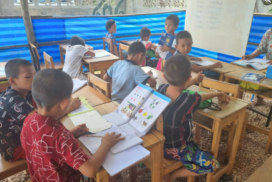As several countries around the globe grapple with the severe impacts of heatwaves and droughts, the threat to food production has become dire. The effects of the 2023 El Nino, which brought about the most severe heat in 122 years, have exacerbated this situation.
This year, the escalating global warming and climate change present a looming threat of severe famine, affecting approximately 282 million people from 59 countries worldwide. United Nations agencies report that global countries have been experiencing worsening food shortages for the past five years.
A joint statement from the European Union, the UN Food and Agriculture Organization, the International Agricultural Development Fund, UNHCR, UNICEF, UNFP, and the World Bank highlights that vulnerable groups, particularly over 36 million children under the age of five, are falling victim to severe famine. Additionally, those displaced by conflicts and disasters are facing subsequences of worsening malnutrition.
Despite being a country with food security, Myanmar is grappling with internal instability, the consequences of climate change, the impacts of natural disasters and poverty, and a development gap between urban and rural areas. As a result, Myanmar is striving to address food problems, particularly for people in remote areas.
It is anticipated that Myanmar may face a significant challenge in meeting the food requirements of its population, which is projected to reach 100 million by 2050. Therefore, it is imperative to prioritize food security across the nation and to efficiently utilize food resources by minimizing waste and losses. Food loss and waste are major obstacles that must be addressed to solve global food security problems.
Currently, the government is focused on increasing crop yields per acre, including paddy and oil crops such as groundnut, sesame and sunflower, maize, pulses and beans, to meet local demand and generate revenue through agricultural exports to overseas markets. Efforts are also underway to encourage farmers and food producers to increase productivity.
Environmental challenges can lead to food shortages and conflicts in various parts of the world. Despite food production, the wastage and loss of food can result in multiple losses. Therefore, it is essential for all citizens of Myanmar to understand the critical importance of food security and to prevent food loss and waste through all possible means so as to prevent the impacts of food shortages. If so, people can successfully overcome food shortages in unison.
Environmental challenges can lead to food shortages and conflicts in various parts of the world. Despite food production, the wastage and loss of food can result in multiple losses. Therefore, it is essential for all citizens of Myanmar to understand the critical importance of food security and to prevent food loss and waste through all possible means so as to prevent the impacts of food shortages. If so, people can successfully overcome food shortages in unison.














